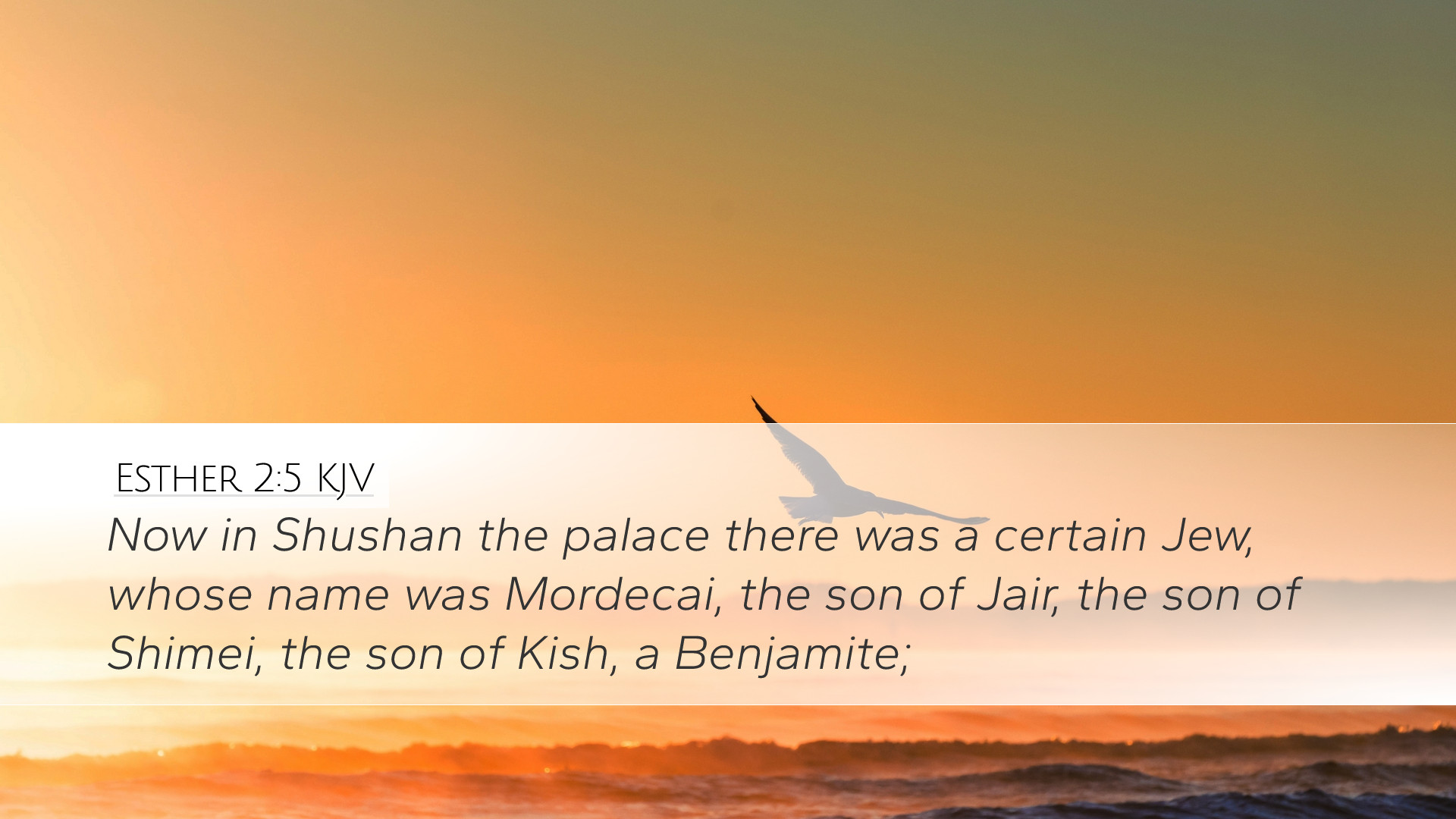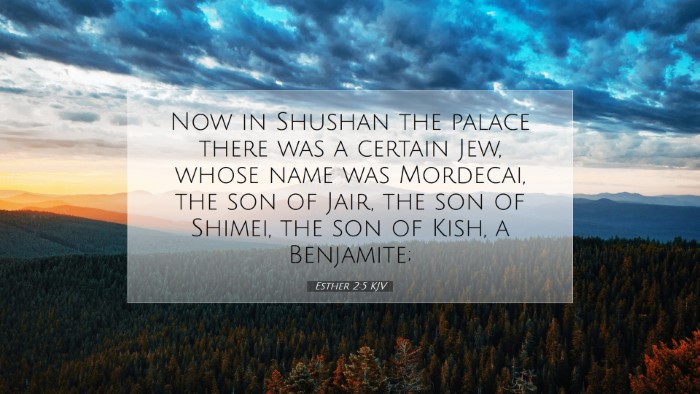Old Testament
Genesis Exodus Leviticus Numbers Deuteronomy Joshua Judges Ruth 1 Samuel 2 Samuel 1 Kings 2 Kings 1 Chronicles 2 Chronicles Ezra Nehemiah Esther Job Psalms Proverbs Ecclesiastes Song of Solomon Isaiah Jeremiah Lamentations Ezekiel Daniel Hosea Joel Amos Obadiah Jonah Micah Nahum Habakkuk Zephaniah Haggai Zechariah MalachiEsther 2:5
Esther 2:5 KJV
Now in Shushan the palace there was a certain Jew, whose name was Mordecai, the son of Jair, the son of Shimei, the son of Kish, a Benjamite;
Esther 2:5 Bible Commentary
Esther 2:5 Commentary
Bible Verse: "Now in Shushan the palace there was a certain Jew, whose name was Mordecai, the son of Jair, the son of Shimei, the son of Kish, a Benjamite;" (Esther 2:5)
Introduction
This verse serves as an introductory note establishing key characters within the Book of Esther. Understanding Mordecai and his lineage sets the stage for the unfolding drama of a Jewish minority in a foreign land during a time of potential peril.
Mordecai's Significance
Mordecai is a central character whose actions and character are pivotal throughout the narrative. He is identified as a Jew, emphasizing the identity and heritage that he carries, which becomes vital in the context of the plot.
Historical Context
According to Matthew Henry, the Jewish people in this period were facing the challenges of living in exile post-Babylonian captivity. Mordecai’s identity as a Jew in Shushan reflects the broader theme of Jewish resilience amidst adversity.
Genealogy and Tribal Connection
The verse outlines Mordecai's genealogy: “the son of Jair, the son of Shimei, the son of Kish.” This lineage carries significance as it connects him to the tribe of Benjamin, a connection emphasized by Albert Barnes, who notes that it links him to King Saul, the first king of Israel. This connection may invite readers to reflect on royal lineage and providential positioning.
The City of Shushan
Shushan, or Susa, is introduced as a prominent location. Adam Clarke highlights its status as the capital of the Persian Empire during the time of Xerxes, indicating that Mordecai’s life unfolds in a place of power and influence, enhancing the narrative's stakes.
Dimensions of Power and Influence
- The geographical setting serves as a backdrop for themes of providence and divine intervention.
- Mordecai’s narrative within the court contrasts with the lives of ordinary Jewish people, amplifying the tension between the Jewish exiles' spiritual identities and their societal roles.
Mordecai’s Character Traits
Mordecai is portrayed as a man of integrity and resolve. His Jewish identity is not merely a cultural identifier but a spiritual one, as emphasized by Matthew Henry. In times of crisis, he remains steadfast in his faith and heritage, setting an example for others.
Lessons from Mordecai’s Life
- The importance of standing firm in faith despite challenging circumstances.
- Recognizing the influence that one’s background can have on their role and responsibilities within a broader narrative.
- Engagement with cultural contexts while upholding spiritual values.
Theological Implications
This introduction to Mordecai raises several theological questions pertinent to the audience of pastors, theologians, and students:
- Divine Providence: How does God’s sovereignty play out in Mordecai's position in the palace?
- Identity: What does it mean to maintain one's identity in a foreign land?
- Leadership: What can Mordecai teach modern leaders about integrity and the exercise of power?
Conclusion
Esther 2:5 is not merely a genealogical note but an invitation to explore themes of identity, providence, and moral integrity. The assertion of Mordecai's Jewishness amidst the grandeur of Shushan suggests a narrative deeply rooted in God's unfolding plan for His people. As the story progresses, the importance of Mordecai's character will continue to serve pivotal roles in both personal and communal dimensions of faith.
This commentary encourages further exploration into Mordecai's life and the broader implications of living one's faith in diverse settings, providing a rich ground for sermon preparation, theological reflection, and scholarly study.


